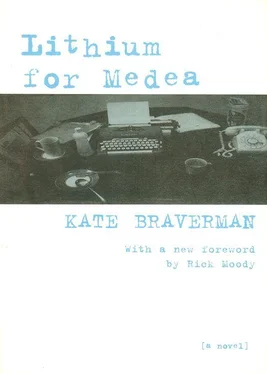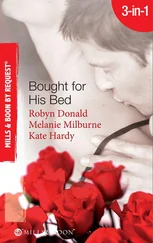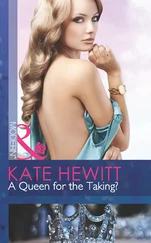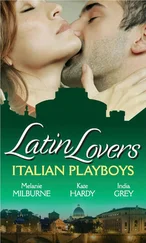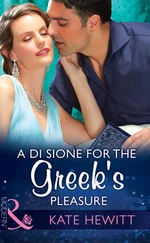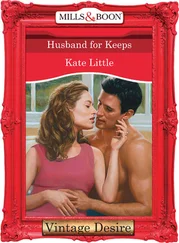My father studied the new doctor. Then he gave him the finger.
Everyone sprang into action. One nurse pried the sheet from my father’s hands. The other nurse and the doctor gripped my father under his armpit. They were pulling him by his good arm, the one they hadn’t taken skin from. I tried to help my father put his bathrobe on. His shoulder was too thickly bandaged from the skin graft. He couldn’t push his arm through the sleeve. I draped it over his shoulders.
My father was standing on his feet. His legs were trembling violently. He seemed startled and breathless, clearly in pain.
“One foot in front of the other,” the doctor said firmly.
My father gave the doctor a brief black stare. With his eyes he said eat it motherfucker.
We edged into the corridor. My father leaned against me. He took tiny broken steps. I tried to match them. My father has always been a good walker. It was one of his hobbies. After the divorce, my father had tried to walk his rage out. He would walk from his house in West Los Angeles to City Hall downtown and back. Or he would walk west, to the ocean, and back again. Walking. Walking. Once he walked forty miles in a single day. He went back later to measure his route exactly by the car odometer. Forty-two miles, he told me proudly.
On his sixtieth birthday my father bought a set of weights. His arms were suntanned and strong. He showed me new muscles in his back. My father wasn’t planning on growing old gracefully. He wasn’t planning on growing old at all. He was deeply motivated. He wanted to outlive Francine, he said.
Now he was bent, thinned, a Lear in his gauzy white storm. He walked the distance of two hospital rooms and collapsed shaken against the corridor wall. They brought him a wheelchair. My father lay trembling in his bed. He seemed to be gasping for air. He could barely hold on to his pen.
AM DYING.
“I think it just feels that way. The doctor told me he saw new pink skin under the bandages. The graft is working.”
DR. LYING. COVER-UP. OPER. WAS FLOP.
“Look at it this way. You’re turning for home. It’s the stretch drive. Anything can happen.”
My father seemed to think of something. He picked up his pad.
CANT WALK FROM PARKING LOT 2 TRACK. COULD PHONE IN BETS. SUCKER PLAY. CANT SEE ODDS OR BANDAGED HORSES. BUT I CANT TALK!!!
“We’ll work out something.”
My father gave me a long hard black stare. THERES NO PT. 2 ALL THIS SUFFERING. WHY???
I thought about it for a while. When I looked back at my father he had closed his eyes. I reached over and felt for his pulse. One thing was certain. The old man was still breathing.
I walked into the corridor. I passed the chaplain. He smiled at me and tipped an imaginary hat. I was struck by his pallor. It occurred to me that the chaplain would know about that bastard death stalking the corridors, that foul-breathed monster. But no. The chaplain wasn’t considering the evil serpent with its coiled stinger and claws. The chaplain seemed to be discussing the dispensation of an unclaimed philodendron with the head nurse. I kept walking.
The emaciated woman in the room next to the alcove where they kept the morphine had her first visitor. He was wearing a business suit. He was writing something down on a large yellow pad. I assumed it was her will.
I darted into the morphine alcove. The nurses were organizing the lunch trays, scurrying like white mice, phones ringing in the nurses’ station, visitors crowding through the narrow gray enamel channel of corridor between carts stacked with half-eaten plates of food, mounds of too-green and too-yellow ground-up mush the dying were served. The morphine alcove was deserted. The key was stuck in the locked drawer. It dangled out like bait. I unlocked the drawer.
What’s the point of all this? my father had asked. I held the morphine bottles in my hand. They were warm, charmed. I was holding plucked hot moons, clear white stars. I could have put them into my purse. I didn’t.
A certain disease had been cut from my father. He had been mutilated, skinned, patched, gouged, stitched. I thought of my father’s painful broken steps in the corridor. My father had always been a good walker. I could barely keep up with him at the track. My father. A short man with broad shoulders and a sturdy, purposeful stride. He had a firm grip. When I held my father’s hand it felt warm like the earth, felt like sun-bloated grains just pulled from the ground.
I put the morphine bottles back into the drawer. I walked into the crowded corridor. There had been a man in the room closest to the elevator. Now the room was empty. I had known the man was dying. There had been a sudden flurry of visitors with too bright, too expensive bouquets. Now the bed was newly made, white and empty. The plants and baskets of fruit were gone. The IV pole and machines were gone. The blinds were open. Sun spilled lazy onto the crisp white sheets. The room was ready to kill somebody else.
I sat down on the strip of grass near the emergency room entrance. I put my head down in my hands and cried. Perhaps someone would come and help me, a kindly churchy-looking older woman with hair sprayed a stiff white-blue under a pastel pillbox hat.
I prepared an explanation. My mother, Francine, had gone sailing. I was worried about her. She was both my mother and my child. In a sense we were sisters. Francine had been a foster child, repeatedly beaten and abused. She lived in homes where she never had a key and the refrigerator was kept locked. And mice fell on her head. She wasn’t surprised when the mice scampered across her skin. She had known they were there in the sewing machine all along.
The man who had been her lover and husband, friend and protector, was lying mute and haunted in the cancer ward, poised between life and death. My father.
And he thinks he is going to die. It’s the second time the black cells ambushed him. And he was up four grand on the Santa Anita meet. And he doesn’t know how he will manage walking from the parking lot into the track. He could bet with a bookie. It isn’t good that way. You can’t see the changing odds. You can’t see if the horse comes out with bandages. Not that bandages mean that much. Bandaged horses win, too. But he can’t talk anymore. He doesn’t know if he’ll be able to drive a car again. You see, the skin graft is pinching his shoulder and neck together so that he can’t really turn his head.
Just today I stood in the morphine alcove just now and put the bottles back. I’ll never be a small white star again. I’ll never dance draped in moon hide again. Or feel a Santa Ana wind slam through my lungs and know myself as young, naked, my navel filled with platinum. I’ll never drift past the last reefs draped in white garlands, eating grapes, the sea a glazed blue eye unblinking.
I cried a long time. I waited for the kindly woman. I would tell her about Jason and my seven years of paralysis and suffering. I sensed feet passing near me. I heard steps. I caught a glimpse of pant legs, a brush of white skirts. The hospital doors snapped open and shut, open and shut. A cold gray mouth.
I waited for something to happen. No one stopped. No one said a single word to me.
I slept and tossed, haunted, shivering, burning and dreaming of Gerald, of Jason. I was being chased under a white lid of moon through streets empty and white and filled with a sense of the sudden and inexplicable, fire and danger. Somewhere a woman I almost recognized was counting, was chanting, was saying over and over if Picasso was the first and the old man with the mandolin was the second, then who will be the third, the third, the third?
I drove to the hospital. It was early morning, already warm and sharp, without haze or fog. A boundary had been crossed. The hills beyond the city seemed hard, substantial, possible.
Читать дальше
